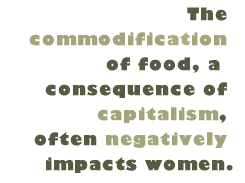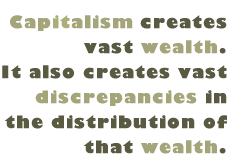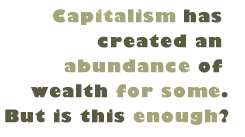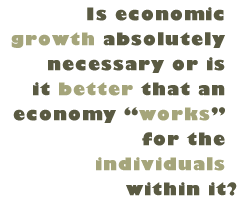Home-Art
329-GS 330-Lit 342-Hum
375-Com 385-GS 410-GS
450, Research-GS 450, Integration
|
|
|
Written by Jessica Albon |
|
|
|
 apitalism,
argue proponents, offers the best of all worlds availability of all that one might
desire while also providing the means to acquire it through well-paying, stable jobs
for everyone willing to work. The government ideally provides nothing, no subsidies, no
welfare systems, no healthcare; the government ideally restricts nothing, no practices
banned, no inhibitions of businesses made legal. "The moral justification for
capitalism," argues Ayn Rand, one of capitalism's most famous proponents,
"lies in the fact that it is the only system consonant with man's rational nature,
that it protects man's survival qua man, and that its ruling principle is:
justice" (qtd. by The Capitalism Site). apitalism,
argue proponents, offers the best of all worlds availability of all that one might
desire while also providing the means to acquire it through well-paying, stable jobs
for everyone willing to work. The government ideally provides nothing, no subsidies, no
welfare systems, no healthcare; the government ideally restricts nothing, no practices
banned, no inhibitions of businesses made legal. "The moral justification for
capitalism," argues Ayn Rand, one of capitalism's most famous proponents,
"lies in the fact that it is the only system consonant with man's rational nature,
that it protects man's survival qua man, and that its ruling principle is:
justice" (qtd. by The Capitalism Site).The culture introduced by capitalism has substantially altered most aspects of modern life. Its practice, while arguably different from its theories, has had a profound effect on the world at large. This paper will specifically address changes wrought by capitalism in the past 500 years within the realms of gender, economy and ecology. These areas will be explored using examples from around the world. While capitalism has had some positive results, unfortunately, the overall impact of capitalism in the areas of equality and the environment seem to be negative. Thus, this paper will attempt to prove that capitalism's current practice has had more negative consequences than positive ones. In order to ensure the reader's understanding of the concepts of capitalism, this paper will begin with a definition as well as a brief exploration of the concepts of capitalism's practice.
|
|
|
As was seen
during the Industrial Revolution (while capitalism grew) and as is seen today,
capitalism is a system that fuels itself. Increased demand for products means increased
jobs, thereby increasing income, which means more people have the means to buy the
commodities they want and need. This then leads to the need for more production, more
delivery and more distribution, all resulting in more employment, increased wages, and
more consumption. One final thought on capitalism must be offered before continuing to examine the results of capitalism's practice. Capitalism necessitates that everyone will act freely and fairly. Adam Smith insisted that when people are free to trade (and are not forced to trade) each will bargain for the best deal and the exchange will work out in the interests of both (Friedman & Friedman, 1-7). The problem is that capitalism relies on an equality that does not exist. Thus, a fair exchange seldom takes place as one party is always disadvantaged in comparison to the other whether that disadvantage arises from cultural values (e.g. being female in an exchange with a male in some cultures), intellectual abilities, or sheer need (i.e. one party generally has more at stake in any deal). It seems that most inconsistencies in capitalism can be traced to the fact that inequalities are prevalent in today's world.
|
|
|
Capitalism also
affects women by commodifying food. This commodification often means women are less
likely to receive adequate nutrition in times of food shortages than are men. Megan
Vaughn examined the Malawi famine of 1949 to determine which groups of people are more
likely to starve (Robbins, 191-193). In January of 1949, no rain fell in Malawi, Africa
and "in some areas the first and second plantings of maize, the main food crop,
failed completely, and wild pigs, baboons, and hippos devastated the remaining
crops" (Robbins, 191). Because Malawi was a British colony at this time, the
British government became involved immediately by organizing agricultural advisors to
lead the replanting of crops (which also failed) and setting up camps to distribute
food. The famine, argued Vaughn, disproportionately affected women because of the
British's focus on capitalism. The British introduction of cash cropping and their
redistribution of land previously owned by women restricted women's access to the means
of production. Additionally, only men were allowed to work as wage laborers rendering
women unable to work for the money required to purchase food in the new capitalistic
system. The British believed that all women were supported by men (either a husband or
father, or perhaps even a brother) and thus when they distributed food through camps
would not distribute food to women. Unfortunately, men often sold this food for profit
(a consequence of the commodification of food) and left women and their children with
nothing to eat. Because capitalism seems to unfairly impact women, Robbins writes, some believe it must be dismantled to make way for equality (Robbins, 359). However, The Capitalism Site explains that capitalism only works when each individual is free to participate equally. The site also says that capitalism is the only economic system that necessitates the sameness of women. Milton Friedman, a Nobel laureate economist, and his wife Rose Friedman co-authored Free to Choose, a text that proclaims throughout that capitalism brings with it equality for all. They write, "a society that puts freedom first will…end up with both greater freedom and greater equality" (Friedman & Friedman, 148). Indeed, in the first world, where freedom is often taken for granted, egalitarianism seems a less distant goal than in areas that are less free. However, it seems, in examples like those offered above, that capitalism has hindered women more than it has helped them. |
|
|
 When it comes to the actual realities of capitalism's effects on the economics, Philip Porter and Eric Sheppard express concern about the economic status of the third world in their book A World of Difference. They write, "the chasm between rich and poor countries has long been great and is increasing," (Porter & Sheppard, 14). They offer evidence that the world's poorest 20% of countries shared 2% of the world's Gross National Product (GNP) in 1970, but by 1993 accounted for only 1.1% (Ibid.). This represents a significant drop, although The Center for Economic and Policy Research (CEPR) asserts that worldwide economic growth has slowed, stagnated and even declined in various countries (including the first world) since the 1970s. This evidence, including their "Scorecard on Globalization: 20 Years of Diminished Progress" indicates that while economic slowdowns and reversals are widespread, they have affected the third world most severely. In the United States, the gap between the rich and the poor has grown significantly wider in recent decades. According to the United for a Fair Economy report, "Divided Decade: Economic Disparity at the Century's Turn," "At the dawn of the 21st century, the distribution of wealth has regressed to the perilous inequality of the 1920s." They go on to offer statistics, writing that between 1977 and 1999, household incomes in the bottom fifth declined (when adjusted for inflation) by nine percent while people earning among the top 1% saw their incomes grow 115% (Collins, Hartman, & Sklar). How does capitalism enable such a discrepancy? When the means of production are owned by individuals, those individuals can leverage that ownership to create more wealth. Lester Thurow, an economist, forwarded the theory that present wealth begets future wealth while present poverty likewise begets future poverty (Robbins, 400). As an example, in the US, seminars on buying rental property abound. If it is the American dream to own one house, then it is surely the capitalist's dream to own many. By charging whatever rent the market will bear, property owners often effectively limit residents' ability to save for homes of their own, thus locking residents into a dependency on landlords. Property owners can often refinance properties they already own to buy new properties, but those without a home have no such opportunity. Therefore, individuals who already own something are better able to expand their wealth than those who are starting with nothing. |
|
|
However, doesn't capitalism offer the greatest opportunities for those starting from scratch? Indeed, in the United States, examples abound of individuals who came from nothing and managed to amass extraordinary wealth. Andrew Carnegie was a Scottish immigrant who worked from the age of 13, establishing Carnegie Steel Company in his thirties (Carnegie Corporation of New York). He worked hard and made himself a very wealthy man, giving way $350 million during his lifetime. Similar examples can be found today as technology continues to evolve, enabling entrepreneurs to break in at the ground level of new industries. Because it offers opportunities for individuals to amass great wealth, many believe that capitalism is the best economic system for the common good. Unfortunately, simply because capitalism overflows with examples of people who have made great fortunes doesn't mean it makes economic sense. Rather, it seems the economy benefits most from a stable government which may in fact be less likely under capitalism (Robbins, 338-339). Additionally, the common good hardly seems well served by a system that in the United States has resulted in the top 20% of people earning 8.9 times the income of the bottom 20% of the population (Porter and Sheppard, 556).   apitalism's practice
today includes the commodification of everything. From the food bought in supermarkets
to the wilderness in India, everything is for sale. John Bellamy Foster, in his book
The Vulnerable Planet explains that capitalism functions as an ecological revolution to
change humanity's relationship with the natural world. He writes that capitalists
believe that "nature's bounty is a free gift to the property owner" (italics
removed, 123). Such a view indicates that there is no harm done by using environmental
resources unwisely, when, in fact there is. This view also shifts the responsibility
for environmental damage from the institution that causes it to the general public who
suffer from it. apitalism's practice
today includes the commodification of everything. From the food bought in supermarkets
to the wilderness in India, everything is for sale. John Bellamy Foster, in his book
The Vulnerable Planet explains that capitalism functions as an ecological revolution to
change humanity's relationship with the natural world. He writes that capitalists
believe that "nature's bounty is a free gift to the property owner" (italics
removed, 123). Such a view indicates that there is no harm done by using environmental
resources unwisely, when, in fact there is. This view also shifts the responsibility
for environmental damage from the institution that causes it to the general public who
suffer from it.The case of deforestation in India offers a strong example of capitalistic interests taking precedence over both environmental concerns and local well-being. In 1916, the Uttarakhand region of Uttar Pradesh was incorporated into British India. Because Great Britain needed massive timber supplies to support their Industrial Revolution, the region was deforested at an astounding rate. Railroad construction meant the destruction of more forests. "By the turn of this century," reveals the website Chipko and the Women of Uttarakhand, "colonial commercial interests were replacing old growth forests with chir-pine plantations for resin extraction purposes." The British appropriated control over the forests so that they were transformed from a local resource to an international commodity. After gaining independence, India continued the deforestation as the government had learned what a valuable resource the trees were. "With economic growth and development as new guiding principles, governments encouraged natural resource extraction on an unprecedented scale" (Chipko and the Women of Uttarakhand). As might be expected, the local environment soon manifested signs that the deforestation was causing great harm. Water shortages became common. Flooding and landslides proliferated, made worse by the mining of many areas that often followed deforestation. In 1977, a landslide killed 44 people and destroyed 150 acres in the Pithoragarh district (Ibid.). |
|
|
While in this
case, the Uttarakhand deforestation was halted by the Chipko movement, many ecosystems,
exploited by capitalism, have not been so lucky. In fact, Foster submits that unless
capitalism is abandoned, the current environmental crisis of land, air, and water will
not be resolved. He writes of achieving sustainability, "according to current
ecological knowledge, we must not simply slow down present economic growth trends but
reverse them. Nothing in the history of capitalism suggests that this will happen"
(Foster, 132). Robbins writes that American children do 280 times the environmental
damage of Haitian children while people who live in high-consumption areas require 400
to 600 acres to sustain their lifestyle (Robbins, 209). Unfortunately, worldwide there
are estimated to be only 170 acres of cultivatable land per person. This high level of
consumption is required for capitalistic growth and reconciling the needs of the
environment and economy, while difficult, is necessary. Robbins describes the conflict
well, writing, "the maintenance of perpetual growth and the cycle of production
and consumption essential in the culture of capitalism does not bode well for the
environment" (Robbins, 210). Cattle production and consumption in the United States offers an example of the ways capitalism ranks the economy above the environment. According to Robbins, "much of the rangeland of the United States has been devastated by livestock herding to the point that it has become desert" (Robbins, 220). Additionally, the grain fed to cattle in the US consumes half of all water used annually, a feedlot steer creates 47 pounds of waste each hour, "not to mention the methane gases that contribute to the destruction of the ozone layer" (Ibid). The grazing of cattle currently threatens more plant species than any one other cause, according to the General Accounting Office. Obviously the grazing of cattle is contributing to environmental destruction. Yet, it continues. This is partially because people in the U.S. consume more beef than in any other country (Robbins, 221). The beef industry has become enormous, especially with the protection of the government. Each year, more than 6.7 billion hamburgers are served in fast food restaurants alone (Ibid.). Long a staple of the wealthy, eating meat is a sign of prestige. As long as it remains an attractive source of food for so many individuals, the beef industry will continue to thrive. Unfortunately, capitalism makes no allowances for the future and present costs of environmental degradation. If such allowances were made, beef production might potentially lose much of its profitability. However, until such a system is instituted, cattle will continue to destroy the environment as American's continue to demand beef. The consumption that drives capitalism is harmful to the environment. Robbins writes that what a society consumes is solely determined by culture (Robbins, 236). If this is the case, then in order for capitalism to operate without devastating the environment, consumption choices must be changed on a cultural level. This assertion that consumption is culturally based does hold some promise that capitalism and environmental health can co-exist. However, such an equilibrium will require a shift to a social value system that places the environment high on the list of priorities. |
  ave the changes
inspired by capitalism been predominantly good or bad? In practice, I believe they have
been detrimental. While capitalism may theoretically provide for greater individual
rights, instead it has served to further entrench gender roles, increase economic
stratification, and decimate the environment. ave the changes
inspired by capitalism been predominantly good or bad? In practice, I believe they have
been detrimental. While capitalism may theoretically provide for greater individual
rights, instead it has served to further entrench gender roles, increase economic
stratification, and decimate the environment.Historically, individuals met the needs of their family through sustenance farming. Such small-scale farms meant less environmental destruction (because pesticides were not as necessary as they are with the monoculture cropping inherent to capitalistic agriculture, among other reasons). Such farming practices could not support large populations which further reduced environmental burdens. Capitalism commodifies both land and food and so everyone must work in order to support the family. Such a demand often means that workers are trapped in less than suitable working conditions, such as those that generally exist in sweatshops where employees may be forced to work 12 hours or more per day in devastatingly unhealthy factories. Though capitalism may ideally provide for greater equality among the sexes, instead it has served to more deeply entrench existing gender roles leaving women marginalized and men forced to be the "provider." Though capitalism may ideally strengthen the economic standing of the rich and poor alike, instead it has widened the gap between them. Additionally, capitalism has negatively impacted the environment, causing companies to commodify natural resources and endanger future environmental health. After assessing all of these effects of capitalism, it seems inevitable to conclude that in practice capitalism has hindered more than helped. |
|
|
|
What, then, is the solution? It seems likely that a solution lies first in distinguishing what is most important in an economy. Is economic growth absolutely necessary or is it better that an economy "works" for the individuals within it? If economic growth is an absolute requirement, at what rate is such growth necessary? And is economic growth more important than future environmental health? Perhaps in seeking out the answers to these questions, the global community can move beyond placing blame (or praise) at capitalism's feet towards a viable system. It is only with such a viable system that equality between men and women, the rich and the poor, and the environment and the economy will be found. Though capitalism proclaims to be all about justice, in practice it overlooks these crucial balances in favor of unrestrained growth. By perpetuating unrestrained growth above all else, it has caused harm to the environment and introduced inequalities throughout society. However, by reassessing priorities and creating goals that do not solely propagate the economy, capitalism could potentially reduce the harm it has done in these arenas. See Works Cited |
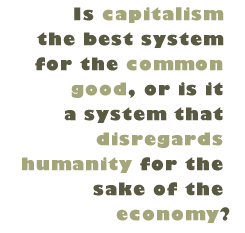
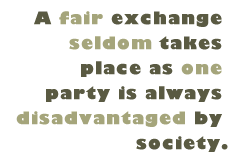
 he roles given to
women and men depend on the culture of each specific area. This makes it difficult to
conclusively point to precise changes instituted by capitalism. However, Robbins writes
that generally capitalism negatively affects women in four ways (Robbins, 356). Of
those four, two are important to this discussion and will be elaborated on. The four
changes Robbins points to are: emphasis on income-producing employment, a shift in
family structure from extended to nuclear families, increasing industry, and the
infliction of first world economic policies on the third world.
he roles given to
women and men depend on the culture of each specific area. This makes it difficult to
conclusively point to precise changes instituted by capitalism. However, Robbins writes
that generally capitalism negatively affects women in four ways (Robbins, 356). Of
those four, two are important to this discussion and will be elaborated on. The four
changes Robbins points to are: emphasis on income-producing employment, a shift in
family structure from extended to nuclear families, increasing industry, and the
infliction of first world economic policies on the third world.